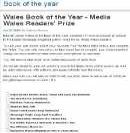
Win a free year's subscription to 'Welsh Country' magazine.
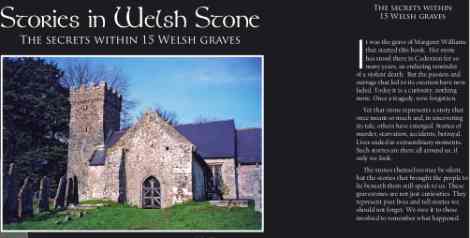
AND a signed copy of 'Stories in Welsh Stone' by Geoff Brookes
Just answer the following three questions ( correctly ):-
1. Which famous Welshman instigated a revolt against the rule of Henry IV of England on September 16th 1400? Was it:-
A. Owain Glyndwr
B. Ron Davies
C. Neil Kinnock
2. Which great Welsh poet wrote "Under Milk Wood"? Was it:-
A. Dylan Thomas
B. Max Boyce
C. Rolf Harris
3. What is "The Mabinogion"? Is it:-
A. A collection of prose stories from early medieval Welsh manuscripts.
B. A holiday drink made with egg-yolk, fermented apple cider and nutmeg.
C. An ancient Welsh clan of ninja like assassins.
SUBMISSION GUIDELINES
The competition is open to the general public. You do not need to be a member of Americymru to participate. Please send all entries to americaneisteddfod@gmail.com and title them Welsh Country Competition in the subject line. Only one entry per email address is permitted. Duplicates will be disqualified.
The winning entry will be selected randomly by line number from the email address above and announced at the Left Coast Eisteddfod in Portland Oregon on August 22nd 2009. The winner will be contacted by email and provided with the necessary contact details to claim their prize.
We do not sell lists of email addresses. We wouldn't on principle and besides we don't associate with the kind of people who buy them.

By Penny Simpson, 2009-04-29
Walking into a white, light studio filled with paintings that layer real landscape with imagined places, or remembered places is quite an experience. Maggie's studio is part of the Bay Art complex in what was Cardiff's old docklands. The building is a warren of studios, reached by original staircases with worn stone steps and decorative railings. I rented its studio flat for a month to complete my novel The Banquet of Esther Rosenbaum. Now, I'm seeing it from the artist's point of view.Outside, thunder, lightening and heavy rain; inside, a rich palette of colour, some of it worked on canvas, or on small squares of thick cardboard. Maggie has created variations on a theme, exploring two particular landscapes but she's not worked them up in a figurative fashion, but something more complex: layers on layers. I like the first painting I see, strong pinks breaking out from a sweep of green brushstrokes. These are claustrophobic spaces, which she says are influenced by old houses she's lived in and their overgrown gardens. Later pictures are linked through a series of motifs, a bird of prey, Scottish pines, bent tree branches and wayward grasses. The most recent pictures are painted in a much freer style and reflect an interest in breaking out of those enclosed spaces. Maggie's stuck; she has a large number of paintings and doesn't know whether to go back and re-work early pictures, or look to the future. I suggest she selects six key works and then creates short narratives around each, using drawings and works-in-progress as satellite pictures to accompany those. It's a bit like reaching the end of one novel, or short story and already having the seeds for the next idea pulling at your imagination. You can't be fully committed to fnishing the older piece, but it's too soon to start the new. She's excited by that idea and it's a move forwards.Back to the office, hopping through puddles. One shoe gets soaked, the other stays dry. Dropping into rehearsals for The Queen of Spades (www.wno.org.uk) where the puppeteers have started work with the singers. The bunraku puppets are extraordinary, the male puppet reflects the feature of its designer John MacFarlane; the female puppet is a dead ringer for Kate Moss. It takes at least 2 puppeteers to work them, each disguised by a black head wrap that makes them look like funereal beekeepers. They wear long black gloves, like old fashioned opera gloves, to minimise distraction as they fold and arrange the puppets' limbs. The Count smokes a cheroot - thanks to a clever device sewn into his torso. The puppeteers' have to have brilliant co-ordination as they must share tasks like shuffling cards, or counting out bank notes in the gambling house where the Countess meets her fate.Bay Art Gallery has a new exhibition, which I plan to visit when I can tear myself away from puppets and Tchaikovsky's wonderful music! (www.bayart.org.uk)
Reprinted with permission from
David Western's blog , all material 2009, David Western --
This week I'll climb down off the soapbox for a while and will get some carving done on the vine section of the Eisteddfod spoon.
I'm going to carve the back of this spoon quite extensively so that it is pretty much the equal of the front. I think that especially with vine and Celtic knot patterns, the look of the spoon is vastly improved when both sides are done. Now because there is an over and under pattern to the vine, I am going over it carefully with a pencil to mark out the pattern before I commit to the knife. It's REALLY easy to get things out of order on the back, especially since you have to think about what is happening on the front and then do the exact opposite. It's always a lot easier to erase a pencil line than to have to repair a errant cut, so the couple of minutes I spend with the graffite is time well spent!

With the lines marked and double-checked, I go at it with the straight knife and with the small chisel. My cuts are shallow at first but get progressively deeper once I know the pattern is all cut correctly.

With the over under pattern cut away and the sharp edges of the vines eased with some chamfer cuts, it is time to round the edges more vigourously. I use cloth backed abrasive paper for this job, BUT I never touch sandpaper to the project until I am fully confident that I won't need to do any more knife carving. All abrasive papers leave behind microscopic bits of abrasive grit which gets lodged in the wood being sanded. When the knife blade passes through this buried grit, its razor sharp edge is quickly dulled and ruined.
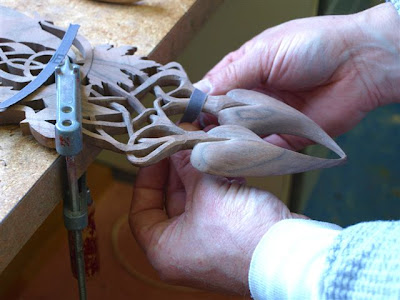
With the rounding completed, I use progressively finer grades of abrasive paper to take out any scratches and leave the surface almost finished. Because the cloth backed abrasive has been largely used across the wood's grain, often times lots of scratches will remain which have to be taken out for the piece to look attractive. Never use a coarser grade than 150 cloth backed abrasive on your project or you will be left with deep scratches that are murder to remove. With paper abrasives, follow the direction of the grain and work up to 220 grade for a nice silky, smooth finish.
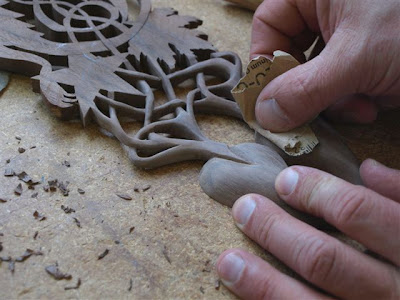
The vines and back of the bowls are now nearly completed. I will do a final shaping and sanding immediately prior to finishing, but for now this will be good. Speaking of being good...please be good by donating a couple of dollars to the Left Coast Eisteddfod and helping the idea of a fabulous Welsh cultural event become a reality. All donations, big or small are gratefully received and all enter you in the running to win this lovespoon when it is finished and presented on August 22 in Portland Oregon
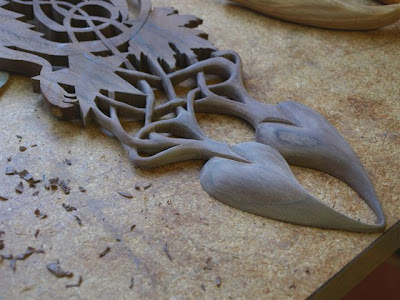

By Kathleen O'Brien Blair, 2009-04-28
Go here
http://www.gfo.org/insider/insiderMay09.pdfLook for American Welsh Heritage. I'm going to send the editor a note with the direct link to the Eisteddfod page here and asking her to drop the last "d""AMERICAN WELSH HERITAGECelebration Coming to PortlandThe Left Coast Eisteddfodd (sic) will be held in Portland, Oregon on August 22, 2009 at the McMenamins Crystal Ballroom, 1332 W. Burnside. An Eisteddfodd is a celebration of all things Welsh including an online talent competition. To view the various talent categories, such as poetry, short story , visual images, etc, or to purchase tickets, visit the events web page by Googling Left Coast Eisteddfod."
By Neil Hughes2, 2009-04-28
Everyone has heard of the fantastic castles of North Wales, Harlech, Caernarfon, Conwy etc, but West Wales has its share of great castles to visit.
Click Here
By Geoff Brookes, 2009-04-28
The facts of the story are simple.Charles Jeffreys, a gentleman of independent means. Prosperous. Had a big house called Gwynfryn near Aberystwyth. A county magistrate.He was sued by Evan Williams, a farm worker. 23 years old.The crime? A violent assault on 4 May 1870.You see, Jeffreys thought that Williams was a burglar and you can understand why, but he wasnt. I better explain.Evan Williams was courting Sarah Williams, a housemaid in Jeffreys house. She invited her beloved to come to the house one night where they could indulge in the Welsh courtship practice of bundling.He took his pal with him for company. This was Evan Jenkins, who was keen to visit Ellen Jones, another servant at Gwynfryn. Jenkins was also to sue Jeffreys for assault as we shall see.Anyway, they turned up, full of anticipation I am sure, at 8.30 pm and were told by the cook, Eliza , to wait until the man-servant had finished his supper. The two boys slipped into the wash house and took off their boots. Well, its important.Then, when the coast was clear, they nipped silently up the back stairs to the maids bedroom.Now, this bundling business.It did exercise quite a lot of opinion at the time since it wasnt an English way of proceeding, but there was nothing complicated about it. All very straightforward actually.The two sweethearts would lie side by side in bed, talking. It was called car war y gwely courting in bed. And the staid English saw it as immoral, pagan behaviour? Cant think why.Lets be honest, it is not without its attractions. Comfortable. Warm. And most importantly, dry. No secret assignations in a wet barn. And it beats standing around in the driving Welsh rain. It gives you a chance to talk about other things too, not just how wet your feet are.As you might imagine, bundling was blamed for all kinds of immorality, for high levels of rural illegitimacy or a hasty marriage to cover shame. You will not be surprised to learn that Ministers preached against it. Bundling was condemned from some pulpits as The Great Sin of Wales. Parents and employers were urged to stamp it out. But the point about the rain swings it for me.Anyway, picture the scene. By 10.00 pm the candle was snuffed out. We have Evan and Sarah bundling in one bedstead and Evan and Ellen in another. All very cosy Im sure. Eliza the cook was in a small bed on the floor, presumably feeling a little left out. Of course everyone was fully dressed, obviously, though the two boys had taken their coats off. Well, it doesnt rain indoors.And everything was fine. As the court report indicates and I shall, where possible, let those involved speak in their own words, as reported to the court, They continued in this position and chatted away until early morn. Very cosy. Entirely innocent I am sure.Then, at 2.00am, they heard someone coming upstairs. Mrs. Jeffreys had heard voices you see. Sure enough, she appeared in the bedroom with a lighted candle. Evan Williams attempt to hide under the counterpane was futile. Hed been spotted. So whilst he was grabbing his coat, she was screaming downstairs to her husband.Charlie! Charlie!It was clearly time for the boys to make their excuses, especially when Charlie appeared, carrying a big stick. Hed been outside, searching the garden, thinking the girls had been talking to men from their window. But it was worse than that. They were inside. It was two in the morning. He was not a happy bunny.I beg your pardon sir, said Evan Williams.I am going to kill you, replied Mr. Jeffreys. To be honest, he does seem rather tetchy.He attacked Williams with his stick, immediately breaking his nose. The poor boy crashed back into the washstand and Williams and Jenkins desperately tried to get downstairs, with blows raining down on their heads and shoulders. They got into the kitchen but the backdoor was locked and bolted. Trapped.In the kitchen there was Jeffreys brother in law, the Reverend Mr. Truman, who happened to be staying at Gwynfryn. This was not the sort of nocturnal entertainment that came his way that often. Tonight he had a ring-side seat. He watched as Jeffreys put his stick on the table and started to thump the two boys mightily and to man-handle them along the hall and out of the front door.According to Reverend Mr. Truman they seemed rather glad to get away. One of them was heard to say, Well I shall never come here again, which shows that at least hed picked up the hint. They also stopped to pick up their boots, though they were apparently too frightened to put them on.Things hadnt quite gone to plan. A bad night all round.The Reverend gentleman, on giving evidence, did say that it was a lucky thing that Jeffreys had not firearms with him, as he might have fired upon them, under the impression that they were burglars. And that was surely the point. As the defence pointed out, could the custom of bundling be any justification for the presence of strange men in a gentlemans house at any time they pleased to come? A good point I think, and certainly one the two girls had ever considered.As it was, the boys injuries were extensive. Cuts, bruises, black eyes, a dislocated thumb and a broken nose. The girls were dismissed. Ellen was back at home with her parents in Ruthin and Sarah was back with her Dad, a master butcher also in RuthinLoves young dream shattered.Ellen told the court that she didnt know whether Jenkins and herself would make a match of it. Evan Williams, on the basis of his annual wages of 14 10s, had, apparently, made up his mind to marry Sarah, though what she thought about the idea isnt clear. What is clear however is that he wasnt going to go courting according to the custom of the country again. The public gallery was quite amused by this comment.But hang on a minute, he had issues.He was unable to go to work as a result of this misfortune. Not only that, but he was in a sick club. And the sick club declined to give him his sick pay because of the way in which hed received his injuries. On the whole, his evening of bundling hadnt worked out at all well.So he wanted compensation for his injuries.The crux of the case was whether Jeffreys had the right to take the law into his own hands in this way.Mr. Johnes expressed some sympathy, speaking as one gentleman to another. The servant girls had violated the trust put in them. But Jeffreys response had been excessive. The assault was serious and the men didnt retaliate or resist. So Jenkins and Williams were entitled to damages. So far so good. They had in fact asked for 50 each, but his honour hoped the jury would consider the gross misconduct in trespassing in Mr. Jeffreys house for what was clearly an immoral purpose. Minimal damages seemed right to him. But he was out of step with rural sensibilities.The jury were only out for 15 minutes and, on their return, showed more sympathy than Mr. Johnes for the old way of doing things. They awarded 15 to each of the would-be lovers, which was the equivalent of Williams annual wages.The English press were rather amused by the whole business, especially since the jury showed some sympathy for the nocturnal adventurers. The Illustrated Police News that ran with the story - and commissioned some lively art work that showed the assault in the bedroom points out that bundling also happened in Scotland. It then goes on In Orkney the very same practise prevails and is no doubt the cause of much rural immorality and shame. Though why Orkney should be identified as a seething hotbed of immorality and shame, rather than the Scottish mainland isnt explained. Perhaps hed had a bad experience with a kipper. He continues, Welsh courtship is a curiosity. No woman, however humble, shows proper self respect who allows a man to approach her unbecomingly and irreverently.Quite right too.But I am afraid to say that these are obviously the reflections of a man who has no experience of Welsh rain.
By AmeriCymru, 2009-04-27
In 2009 we received the following communication from Mike Jenkins ( excerpted ) "Dear friends, Here is a poem which I recently wrote , which you can use on your site if you wish.". We proudly present Mike's poem below.
Jumping forward to 2018 we are also excited to include a short film based on the poem. 'Journey' is an Al Jones Weird Unit Film. 'Journey' will be premiered at the Cardiff International Film Festival on October 21st.
..
Journey of the Taf - Mike Jenkins
...
It begins in the centre of a mountain, waters breaking.
Nobody can say
exactly where
I come from :
parents Earth and Water
and the midwife Air.
Soon Fire, the sun
and everything
I feed upon.
This place of summits
called a watershed :
tears as light
stings my eyes.
I am just a stream
a nant, a toddler
finding my way
downslope, over the edge
of my mother
and with my father's constant
push of rain.
One like many others
till I start to cut teeth,
to haul stones
to erode the bed
and banks into a gorge.
I'm moving quicker
with steeper gradient,
my veins pulse
with the thrust of water
like a salmon at the point
of a journey across the world.
Soldiers with back-packs
and booted outward-bounders.
fight against my movement,
believing it's a challenge.
The children who paddle
squeal, splash and fling
their stones, sound like
an echo in my bones.
The Sun, my teacher,
comes and goes
promising destinations
and then, dips down low;
so any season
I could be bellyfull
or parched to a trickle.
Sheep sip clear water
heads bowed as in prayer
to a lost mother ;
or they're dead weight,
blood mingling with light,
soon a veil of flies.
Winding and wending around
scarp and spur
I reach a sudden drop,
a ledge of resistant rock:
the descents of childhood
then youth when greys
and blues and browns
become a frothing white ;
into the devil's punchbowl
and a whirling might.
Here secret swimmers come
to shed their many skins
and exuberant leapers
plunge into a scream
and come out laughing.
I am joined by others.
by brothers and I'm 'Fawr'
to their 'Fechan',
they emerge on the scene
demanding confluences,
driving deep into chasms
before we're all lost
in a man-made lake :
they term it 'llyn'
but it is reservoir,
a store of water
we are schooled into
( even in most vivid reflections
we wear our grey uniforms ).
I straighten, I widen,
my girth held by bridges
and above are viaducts
which span into another age.
Rocky islets - trees and bushes
growing from them - bring doubts
as I begin to be fixed,
my route determined by walls
and a weir which parodies
the earlier waterfalls.
Now salmon struggle upstream,
as I welcome the many heron
whose measured wing-beats
are like the peace I strive for
and the returning colours
of the kingfishers diving
like winged rainbows.
All this, as I am dumping-place
for trolleys, cans and bottles
like some cess-pit of the past,
some cholera-infested slum.
My parents seem so far away :
mountains aloof, quarried or conifered
and clouds that drop their load
then move on. They call me Taff
but I much prefer my Welsh name
(its what I call myself
and sounds like a stones edge).
Sometimes I seem to slumber along
all controlled by sluice and gate ;
sometimes Im far too busy
to notice those who gaze
like seagulls on the bars,
or those who cavort in heat ;
too busy with the flow, the downward trek.
I have too many shadows :
rail and trail, the once canal,
higher up the road obeys the curve.
Each shadow more purposeful
to traffic and trade;
I begin to wonder
why I move in such haste
and whether I will be
beyond it all, lost.
There are so many white weeds
hanging in the trees,
fluttering like flags of surrender
sometimes falling and filling
into tumours on my surface.
Just as cormorants are fishing
so I begin to sense the sea.
Silt accumulates in my bed,
slows me down after years
of scraping and scouring;
I begin to meander,
to waver across the floor,
the buildings start to ignore
my presence and there are outpourings
secretive and poisonous
which seep into my limbs.
Becoming sluggish, my murky waters
of blurred vision in the suburbs.
I try to remember stretching terraces
where the only vines were children
spreading tendrils of imagination.
The mud is gathering,
the flood-plains a resting-place
for birds on their journey south.
Anglers wade out to tempt
the fish with threaded flies.
I yawn into the city
past a parkland of lovers
and solitary office-workers,
I am broad and straight now
without the energy of gradient.
The grand stadium looms
as if it were a ship of state,
but finds no reflection.
I have almost forgotten
the distant mountains I came from,
the fact I am water at all.
Afon is a slow way of saying ,
it seems to suit me better
than the rip of river.
Already I can feel the saltiness
creep into my body
and seagulls mocking calls
hover then swoop all day.
At the Bay, Im trained and tamed.
On calmer days feel stagnant;
when theres a restless breeze
I begin to wave and voices
of my ancestors come back :
Once you were black, all thick
with dust like a colliers throat.
Once this was flats of mud
where waders and dippers
would pick for worms.
Now I am becalmed,
waiting for the gates to open,
where I will lose my name.
It is a different sun,
one that threatens to burn up,
to leave me dispersed
into the Channel and after.
A roof of slate, faade of glass,
the twirling pipes of a carousel
all bring back reminiscences
of pebbles carried, reflections borrowed,
stirrings under a waterfall.
It is night-time and the moon
is whole and crying out
like a barn-owl over moorland.
I must go and never know
what will become of me.
Mike Jenkins
By Ian Price2, 2009-04-26
Many cultures have rights of passage. In ancient Sparta, boys would be sent alone into the wilderness to kill a lion. In certain American Indian tribes, boys would perform a similar feat of bravery by killing a bear. In Wales there was another kind of right of passage. It to concerned a journey, an endurance test and a killer. It was called The Scottish Trip.The Scottish trip took place every two years when the tribes of the Taff sallied north in order to remind the clans of the Picts and Scots that any illusions they had about being the superior Celtic rugby playing nation was just that an illusion.Old warriors who had earned their spurs would save up for two long years, book into a nice hotel, travel to Scotland on a Wednesday and return at leisure on the following Monday. They would return with trophies designed to placate their wives; phenominal amounts of whisky, haggis, Pringle sweaters, plaid shawls, Scots bonnets, Arran cardigans and tartan blankets would travel south two days after the game at Murrayfield.The more impetuous of the Taff however, who, being young and or just plain stupid would opt often on a whim to travel to Scotland without a match ticket on The Killer.The Killer was the name given to a train and a journey that entailed travelling from the South Wales valleys to Scotland and back in 36 hours. We would depart at 20:00 on Friday night and arrive back at 08:00 on Sunday morning. In that time, myths were created, legends where born and some were lost forever in the mists of the Scottish moors. The more fortunate were lost in the arms of a welcoming Scottish lass.The trip for my compadres and I would start at Treorchy station. We were greeted by a twelve car set Pullman with very comfortable seats. We were also greeted with posters that had twelve inch high letters categorically stating that no alcohol whatsoever would be permitted on the train. To ensure that this edict was obeyed, a police officer was assigned to be our councillor and friend. The officer, who was wise in the ways of rugby supporters, knew full well that this was a bad law written by a bad god and so after a brief pep talk about behaviour would disappear into the guards van for the duration. He was rewarded with our complicity; by the time we left Cardiff General Station, some twenty miles away, the train was in effect a peripatetic brewery with a couple of distilleries and vineyards thrown in for good measure.The outward journey was usually a calm affair as we wound our way north through the Saxon lands. We would pass non stop through Gloucester, Lancaster and Carlisle finally reaching Waverly station in Edinburgh at 06:00 on Saturday morning. Those with enough sense had stopped imbibing at around midnight and had settled down to be lulled to sleep by the clickety clack of the rails. Others, who regarded themselves as stuntmen of rail travel and alcohol consumption, would continue partying until around four in the morning only to find themselves in a terrible mess two hours later as they were ejected into the cold Scottish air.On arrival at Waverly there was a sudden realisation that kick off at Murrayfield wasnt for another eight hours and the bars didnt open for five. Despite this set back we would all wander into Princes Street in search of frolics and food but mostly food. Fortunately the good burghers of the city, who were never short to see a financial opportunity, had opened such outlets as British Home Stores and Marks and Spencer. Inside these emporiums it was warm and cosy and all day breakfasts were on hand. This was when the first culture shock would hit.The Scots had a predilection for frying almost everything they ate in beef dripping. This included eggs, bacon, sausages, tomatoes, hash browns, and bread. It also appeared that everything had been cooking for about three hours before we reached Edinburgh. The eggs were of the consistency of vulcanised rubber whilst the sausages defied cutting by all but the strongest of serrated knives. Brittle bacon rashers would disintegrate on sight and convinced us that consuming the stuff was as close as most of us would ever get to eating broken glass. I and my brother Chris attempted to get through this fare but failed miserably. It was the coffee that finished us off; we realised it had the look and smell of Bovril and so we decided to search the metropolis for something more palatable.After wandering around for sometime we noticed what appeared to be a small restaurant at the very top of Princes Street. There were only a few people sitting inside and so we decided that this was the place for us. We sat down and asked for the menu only to be told that there wasnt one as the only food they served were pancakes with or without syrup or cream. Allright! We thought. Lets have one each to start off with - both with cream. Kerrist! The pancakes were the size of dart boards presented on flat plates. Eating them piping hot with the accompaniments was obviously an art form that would need a ten year apprenticeship. There was no fear of putting on weight with this food as the effort needed to control the cream meant we had to burn up at least a thousand calories per pancake keeping the stuff on the table. Nevertheless, we ate three each.Looking out of the restaurant windows between frenzied cream corralling we could see that the city was coming alive. Pipers had been strategically placed outside various establishments to drum or should that be pipe up business and small groups of red and white wearing punters had gathered to listen to the unfamiliar. We wandered out to join them and I distinctly heard someone say as they passed I love the sound of bagpipes disappearing into the distance. Then it started to rain.The drizzle persisted throughout the morning. Familiar faces appeared and disappeared in the greyness of Edinburgh and its looming castle. We were wet, cold, tired and very thirsty by now. After a quick recce we realised that the centre of Edinburgh had scant few watering holes. This coupled with the fact that there was a temporary population explosion of beer deprived Taffs led us to form a plan. We (Myself, my brother, Will Panic, Gwyn Jenks and Old man Eynon) would climb the hill to Edinburgh castle and drop down into the old town on the other side and find a nice quiet place to sip and rest.The hill to Edinburgh castle looks innocuous enough until one stands at its base. The penny dropped after the first fifty yards; we were in fact trying to get into a castle charming buildings designed to oppress and dissuade unwelcome visitors. By the time we reached the top, old man Eynon was looking for an oxygen tent, Will Panic could see doom in every step and Gwyn Jenks swore hed never look at another Woodbine again as long as he lived. Chris and I were veteran mountain walkers and failed to see what all the fuss was about. Mind you I wouldnt have fancied the climb if someone had been shooting arrows at us at the same time.The climb down the other side was equally as steep but a dawdle for all. At the bottom Gwyn Jenks lit up a Woodbine and professed to have enjoyed the mountainous excursion whilst Panic was looking intensely at the slope wed just descended and seemed to be making mental notes about the return journey he would have to make in the semi darkness. Eynon, succinct as ever, looked at his watch and gasped Right! Thats it! Its eleven oclock. If we dont find a pub in the next ten minutes Im going to fucking kill you all. As providence would have it we did. It was called The Scots Grey and it was open.When we walked inside I remember saying Why did we travel to Scotland? - this was because it had the look and feel of a pub called The Bricks in Tynewydd just up the valley from where I lived. The bar was small with a pot bellied stove in the middle of the room. There was a TV stuck up in a corner behind the bar. There was a dartboard, the smell of old tobacco and there were about ten punters in there who looked as though they had stayed there throughout the previous night. Panic whispered to me Where have you brought us to boy? We must have looked rougher than the clientele who never batted an eyelid but to say that the landlord was bemused is an understatement of the first order. He gave us a knowing look and asked Up for the game? As we were festooned with leeks, daffodils and all things red and white I felt a quip was in order. No I said Were fishing. Isnt this Loch Lomond. Thank the stars he laughed out loud.It wasnt long before we had gleaned that the game would be shown on the television if we wished to stay and watch. And so we did. The usual three hours of pre match revelry ensued where Celtic connections were re established at the expense of the English establishment. We drank copious draughts of Tennants Extra beer and the occasional scotch. By the time the game ended we were convinced we could run back up to the castle and down the other side. Fortunately we were directed away from this tortuous route and told that there was a gentle slope that would take us straight to Waverly station. We thanked our hosts for a memorable afternoon and made our farewells at around half past four. The train home was due to leave at six that evening and so after a swift mooch for gifts in Princes Street we headed for the platform and the anticipation of another fourteen hour journey. I bought a packed quilt which was on offer at a farcically low price; I figured I may as well be comfortable on the sobering return trip.Many of the walking wounded met at the Waverly platform clutching their bottles of Scotch and memorabilia. The train was standing waiting for us - as were about forty police officers who had been told to confiscate anything alcoholic. This wasnt theft though as the goods could be redeemed once we had re entered Wales. It was standard policy apparently because of all the trouble English football supporters had caused in Glasgow over the years.. Whatever, I retained my quilt, found a comfortable seat, placed it behind me and settled down for a snooze. I woke at around 2AM somewhere in Northern England.TO BE CONTINUED.
By Neil Hughes2, 2009-04-26
The Mari Lwyd, used to come calling all over South Wales at Xmas and New Year, but the tradition died out.Interest is increasing though and the tradition is being revived
Mari Lwyd
The "longlists" for the Wales Book of The Year Award 2009 were announced at a ceremony at Bangor University on April 22nd. There are ten contenders in each category ( English and Welsh language ). This will be whittled down to three when the "shortlists" are announced at The Hay Festival on May 25th . The winners will be announced on June 15th and will each receive a cash prize of 10,000GBP . If you want to read more about the authors, the books, the competition itself or vote for your own personal favorite follow the links above.
Of course its difficult to vote for a title that you havent read, so why not order one or two of them? Many of them can be found on the Americymru store linked below ( with links to purchase via Amazon ) and there is still time to have them delivered before the shortlist or the ultimate winner are announced.
If anyone would like to comment on or recommend any of these titles here on Americymru please feel free to do so in the comments box at the bottom of this page or on your own blog if you wish. We will try to review a number of these titles on the site in the coming weeks.
Buy Welsh Book of The Year titles here.











